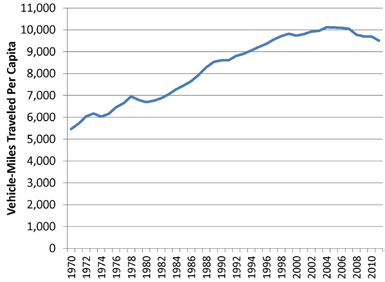“From World War II until just a few years ago, the number of miles driven annually on America’s roads steadily increased. Then, at the turn of the century, something changed: Americans began driving less. By 2011, the average American was driving 6 percent fewer miles per year than in 2004. (See Figure ES-1.)
“The trend away from driving has been led by young people. From 2001 to 2009, the average annual number of vehicle miles traveled by young people (16 to 34-year-olds) decreased from 10,300 miles to 7,900 miles per capita—a drop of 23 percent. The trend away from steady growth in driving is likely to be long-lasting—even once the economy recovers. Young people are driving less for a host of reasons—higher gas prices, new licensing laws, improvements in technology that support alternative transportation, and changes in Generation Y’s values and preferences—all factors that are likely to have an impact for years to come.
“Federal and local governments have historically made massive investments in new highway capacity on the assumption that driving will continue to increase at a rapid and steady pace. The changing transportation preferences of young people—and Americans overall—throw those assumptions into doubt. The time has come for
transportation policy to reflect the needs and desires of today’s Americans—not the worn-out conventional wisdom from days
gone by.”
Read the entire article at Transportation & the New Generation (pdf).



